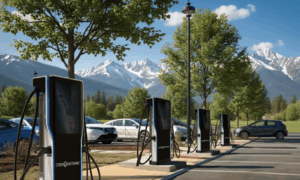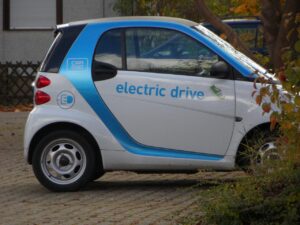
Home / EV Charging News / Electric Cars and the Future of Auto Insurance: Analyzing how the rise of electric vehicles may impact the auto insurance industry, including factors such as safety features and maintenance costs
The automotive industry has changed dramatically with the advent of electric vehicles (EVs). As more and more people adopt electric cars, it is essential to explore how this shift may impact various sectors related to automobiles, including the auto insurance industry. In this article, we will delve into the potential implications of electric vehicles on auto insurance, focusing on factors such as safety features and maintenance costs.
Electric cars, also known as electric vehicles (EVs), are automobiles powered by electric motors instead of conventional internal combustion engines. These vehicles use rechargeable batteries to store electricity and offer a greener alternative to traditional gasoline or diesel-powered cars. With advancements in technology and infrastructure, electric cars have gained popularity due to their environmental benefits and long-term cost savings.
Electric vehicles bring several advantages to both car owners and the environment. They are considered more environmentally friendly because they produce zero tailpipe emissions, reducing air pollution and greenhouse gas emissions. EVs also offer lower operating costs as they require less maintenance and have fewer moving parts compared to traditional vehicles.
One crucial aspect of electric cars is their emphasis on safety features. Electric vehicles often come equipped with advanced safety technologies such as collision avoidance systems, lane departure warnings, and adaptive cruise control. These features enhance driver and passenger safety, potentially reducing the likelihood of accidents and insurance claims.
The increased adoption of electric cars can have implications for auto insurance premiums. Insurers take various factors into account when determining insurance rates, including the vehicle’s make, model, safety features, and repair costs. As electric vehicles typically have advanced safety features and lower repair costs, they may attract lower insurance premiums compared to traditional combustion engine vehicles.
Electric cars generally have lower maintenance costs compared to their conventional counterparts. They have fewer moving parts and require less frequent servicing, leading to potential cost savings for EV owners. As a result, insurance providers may need to reassess their coverage and adjust policies to reflect the reduced maintenance costs associated with electric vehicles.
Telematics, a technology that combines telecommunications and informatics, is playing an increasingly significant role in auto insurance. Telematics devices can track and transmit data related to driving behavior, including speed, acceleration, and braking patterns. Insurance companies can leverage this information to offer personalized premiums based on individual driving habits, promoting safer driving practices and potentially reducing insurance costs.
The rise of electric vehicles presents both challenges and opportunities for insurance companies. Insurers will need to adapt their underwriting practices and pricing models to accommodate the unique characteristics of electric cars. They may also explore partnerships with electric vehicle manufacturers and charging infrastructure providers to offer bundled insurance and charging packages, providing added convenience for EV owners.
Many governments worldwide are encouraging the adoption of electric vehicles by offering various incentives and benefits. These initiatives include tax credits, subsidies, and grants for purchasing electric cars or installing charging infrastructure. The availability of government support can impact the demand for electric vehicles, subsequently influencing the auto insurance industry.
To stay relevant in a changing landscape, auto insurance providers must proactively adapt to electric vehicle trends. This includes developing specialized insurance products tailored to the needs of electric car owners, ensuring coverage for unique components like the battery pack and charging infrastructure. Insurers can also explore partnerships with electric vehicle manufacturers and leverage data analytics to refine their risk assessment processes.
With the growing popularity of electric cars, specific insurance providers have emerged to cater specifically to the needs of EV owners. These specialized insurers understand the intricacies of electric vehicle insurance and offer comprehensive coverage options that address the specific concerns of electric car owners. When selecting an insurance provider for your electric vehicle, it is essential to consider their expertise and coverage offerings.
As an electric vehicle owner, there are several considerations to keep in mind when it comes to auto insurance. It is crucial to assess the coverage options provided by insurance companies and ensure they adequately protect your electric car, including its unique components. Additionally, reviewing the insurer’s claims process, customer service, and reputation within the electric vehicle community can help make an informed decision about the best insurance provider for your needs.
The rise of electric vehicles is just one aspect of the rapidly evolving automotive industry. As technologies like autonomous driving and connected cars continue to advance, auto insurance will face further disruptions. Insurance companies must remain adaptable and embrace innovation to navigate these changes successfully. The future of auto insurance lies in leveraging data, technology, and partnerships to provide customized coverage and adapt to the evolving needs of consumers.
Electric cars are reshaping the automotive industry, and their impact extends to the auto insurance sector. As electric vehicles become more prevalent, insurers need to adapt their offerings to meet the unique needs of electric car owners. From adjusting insurance premiums based on safety features and maintenance costs to leveraging telematics and forming strategic partnerships, the insurance industry must embrace change and innovation to stay relevant in the electric vehicle era.



